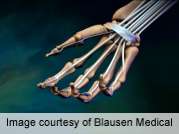Most patients who undergo open carpal tunnel release are pleased with the results and free of symptoms more than a decade later, according to a study published in the June 19 issue of The Journal of Bone & Joint Surgery.
(HealthDay)—Most patients who undergo open carpal tunnel release are pleased with the results and free of symptoms more than a decade later, according to a study published in the June 19 issue of The Journal of Bone & Joint Surgery.
Dexter L. Louie, from Brigham and Women's Hospital in Boston, and colleagues assessed the functional and symptomatic outcomes of 113 patients who underwent open carpal tunnel release from 1996 to 2000 performed by the same surgeon. Follow-up was conducted at an average of 13 years after surgery, using validated, self-administered questionnaires. Outcomes included satisfaction with surgery and the Levine-Katz symptom and function scores, ranging from 1 point (best) to 5 points (worst).
The researchers found that the mean Levine-Katz symptom score was 1.3 points, and 13 percent of patients had a poor symptom score (?2 points). About a quarter of patients (26 percent) had a poor function score (?2), with a mean Levine-Katz function score of 1.6 points. Weakness in the hand was the most common symptom-related complaint, followed by diurnal pain, numbness, and tingling. Nocturnal pain and tenderness at the incision were the least common symptoms. The majority of patients (88 percent) were completely or very satisfied with the surgery, with 74 percent reporting complete resolution of symptoms. More men than women had poor function (33 versus 23 percent). Two patients had repeat surgery.
"Our results suggest that the long-term results of open carpal tunnel release are excellent, with patients experiencing consistent pain relief over 10 to 15 years," the authors write.
One or more authors disclosed financial ties to an entity in the biomedical arena.
More information:
Abstract
Full Text (subscription or payment may be required)
Editorial
Health News Copyright © 2013 HealthDay. All rights reserved.






















